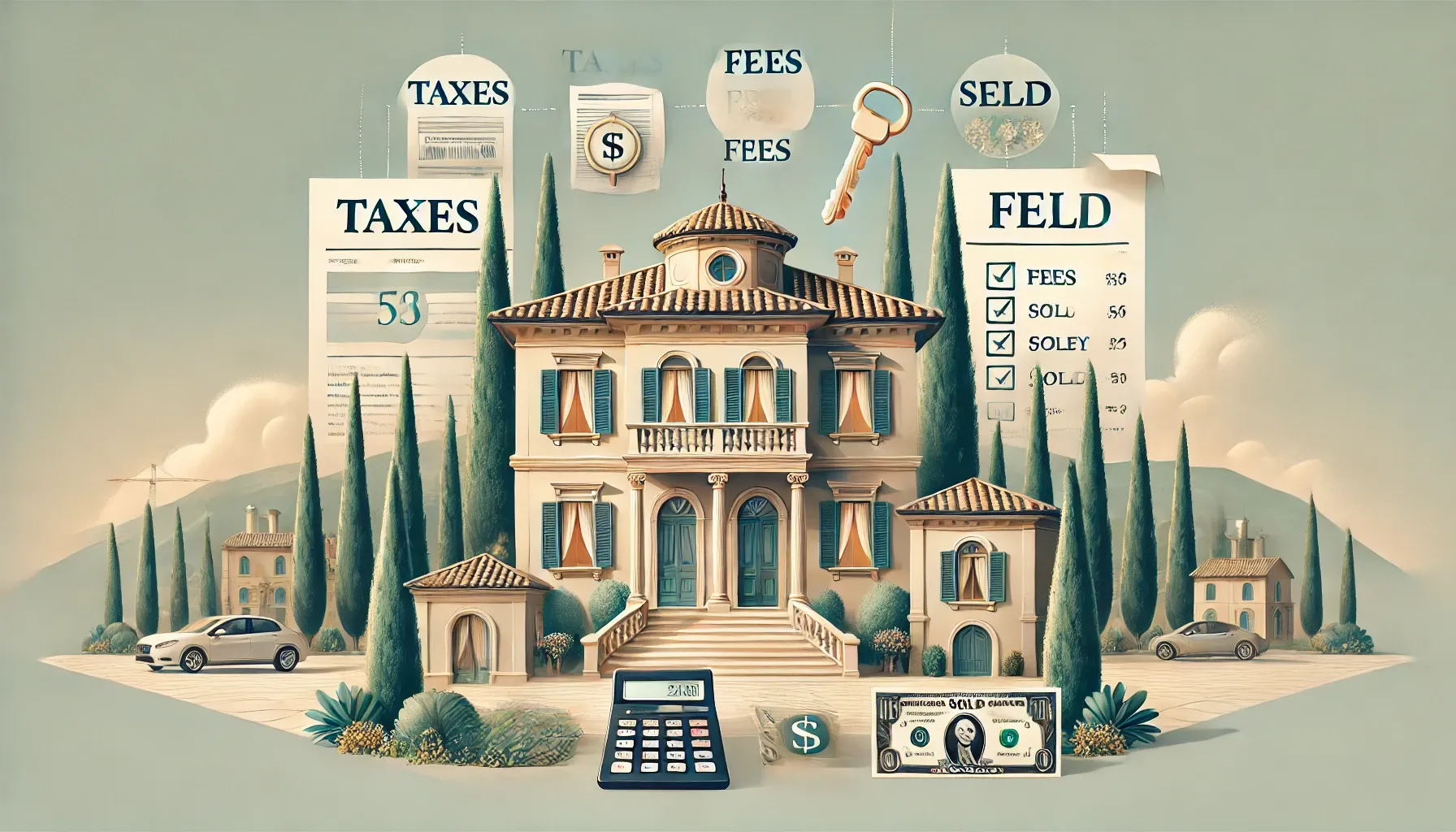Taxes and expenses when buying real estate in Italy: what do non-residents need to know?

- What are the financial aspects of purchasing real estate in Italy for foreigners?
- What are the property taxes in Italy for residents and non-residents?
Introduction
In this article, we will examine all the finances related to purchasing real estate in Italy, as well as discuss the tax implications for foreign buyers. Additionally, we will touch on topics such as the sale, inheritance, and gifting of real estate, as well as consider additional expenses.
Taxes when purchasing real estate
When making a decision to purchase a new property in Italy, it is important to consider the value-added tax, which is 10% of the purchase price. In the case of buying a property on the secondary market, you will have to pay a registration fee, which is 9% of the cadastral value of the property. It is worth noting that the cadastral value is often significantly lower than the market value, which is important to take into account when planning your budget.
Tax benefits for foreigners
For foreign nationals who obtain residency status within 18 months after the purchase of real estate, there is an opportunity to take advantage of tax benefits. In such a case:
- VATThe interest rate for new housing will be reduced to 4%.
- For secondary objects, the tax will be only 2% of the registration fee.
However, this deadline is critical: if you do not manage to obtain residency in time, you will lose the opportunity to enjoy these tax benefits and will be forced to pay the outstanding tax amount, as well as a penalty, which can be reduced if you promptly report your situation.
Conditions for maintaining tax benefits
Those who own real estate, both foreigners and Italians, should note that in order to preserve the tax advantages after purchase, it is worth avoiding the sale of the property for five years. If you decide to sell your apartment before the expiry of this period, you can still retain the benefits if you proceed with the purchase of a new property and obtain residency within a year of the sale.
Additional expenses
Don't forget about additional costs, such as:
- Registration fee,
- Mortgage fee,
- Cadastral fee.
These fees range from 50 euros for each of the operations when buying a secondary home, in the end the total amount will be around 150 euros. As for new buildings, the total costs will rise to 600 euros, as each of these fees is estimated at 200 euros.
Expenses for preparing documentation
It is also necessary to consider the expenses for preparing the preliminary purchase agreement, which can vary, but in most cases amount to at least 350 euros. This amount includes a fixed fee of 200 euros, as well as a percentage of the deposit amount and state fees.
Translation services and notary services
In addition, the costs for translation services and notary witnesses can also be significant: their fees start at 850 euros. These expenses are mandatory for buyers who do not speak Italian and need professional assistance to prepare the notarial deed.
Annual tax liabilities
In addition to the aforementioned expenses, real estate buyers should keep in mind the annual municipal tax (IUS), which includes various local fees:
- Tax on municipal services (TASI),
- Waste disposal fee (TARI),
- Property Tax (IMU).
These amounts can vary significantly depending on the region where the property you purchased is located. All these taxes, along with other expenses related to owning and using property in Italy, can lead to substantial financial costs.
Imperial property tax
The imperial property tax, known as IMU, is determined based on the cadastral valuation of real estate and ranges from 0.4% to 0.7%. The specific rate depends on the municipality where the property is located. Since 2015, owners of their first residential property, which serves as their primary residence and benefits from purchase incentives, are exempt from paying this tax.
TASI tax
Worth mentioning is the TASI tax, which is a local contribution used to fund various public services such as:
- street lighting,
- improvement of parks and areas
- cleaning of public places,
- other important aspects of urban infrastructure.
This tax, like TARI, is the responsibility of all owners and tenants, and there are no exceptions. Utility bills can vary considerably, depending on the size of the property, the availability of amenities such as a swimming pool or security system, and the characteristics of the region where the properties are located. Typical annual costs can range from €500 to €6,000; the lowest costs are most often found in Calabria, but the level of services provided may not meet expectations.
29 September 2025
9 October 2024
9 October 2024
29 January 2025
29 January 2025
Tax notification
It is important to emphasize that the approaches to notifying property owners about tax assessments can vary across different municipalities in Italy. In some areas, the tax calculation is sent by mail, while in others, owners are required to calculate their tax obligations themselves and make the payments. Incorrect calculations may result in penalties, which creates an additional incentive for both locals and foreigners to seek professional help from tax consultants.
The services of such specialists can cost around 50 euros, but there is the option to go to public institutions where the cost will be significantly lower, although you will need to wait in line for some time.
Taxes for non-residents
Non-resident foreigners doing business with Italy should be prepared for progressive income tax rates that range from 23% to 43%. Added to this are local levies ranging from 0.9% to 1.4% and municipal taxes amounting to 0.8% of income earned. Income tax is levied only on income earned within Italy.
The relationship between Russia and Italy is governed by an agreement to avoid double taxation. This can be important for taxes on rental income, where the aforementioned rates apply, and it may be possible to account for maintenance and repair expenses, which should not exceed 30% of the actual profit.

Conclusion
In concluding our research on taxation and expenses related to purchasing real estate in Italy, I want to emphasize the importance of thorough preparation and understanding of all the associated aspects. As a potential buyer, I have realized that every detail, from the initial deposit to annual taxes, requires careful examination and smart planning.
Acquiring real estate is not just an investment of funds, but also a complex process that involves significant financial commitments. It's important to consider not only the initial expenses, such as taxes (including VAT and registration fees), but also ongoing obligations in the form of property taxes and utility payments. These costs can vary depending on the region, so being aware of useful nuances can help avoid unpleasant surprises.
It is also important to note the significance of obtaining residency, as it opens doors to preferential tax rates and additional benefits. However, it is essential to carefully monitor the deadlines and conditions to avoid losing these privileges. I was struck by how serious the consequences of not adhering to the established procedures can be.
Taxes for non-residents
It should be emphasized that there are also unique rules and taxes for non-residents that need to be considered when planning their budget. Tax rates can be significantly higher than for residents, and double taxation agreements often require careful analysis to accurately account for one's income.
Recommendations for potential buyers
- Study carefullyall expenses at the stage of purchasing real estate.
- Please take into accountall fixed expenses, including taxes and utility payments.
- Establish residencywithin the stipulated time frame for obtaining tax benefits.
- Contact the specialists.for obtaining consultations on tax issues.
In conclusion, it is important to remember that accidents should not play an important role in the process of buying real estate in Italy. I recommend every buyer to prepare in advance, to study all aspects in detail and, if necessary, to contact specialists for advice. As my experience has shown, openness to the new, as well as the support of professionals can be the key to a successful transaction and painless adaptation in a new country.
Comment
Popular Posts
29 September 2025
391
9 October 2024
1485
9 October 2024
9942
29 January 2025
1530
Popular Offers

Subscribe to the newsletter from Hatamatata.com!
Subscribe to the newsletter from Hatamatata.com!
I agree to the processing of personal data and confidentiality rules of Hatamatata














